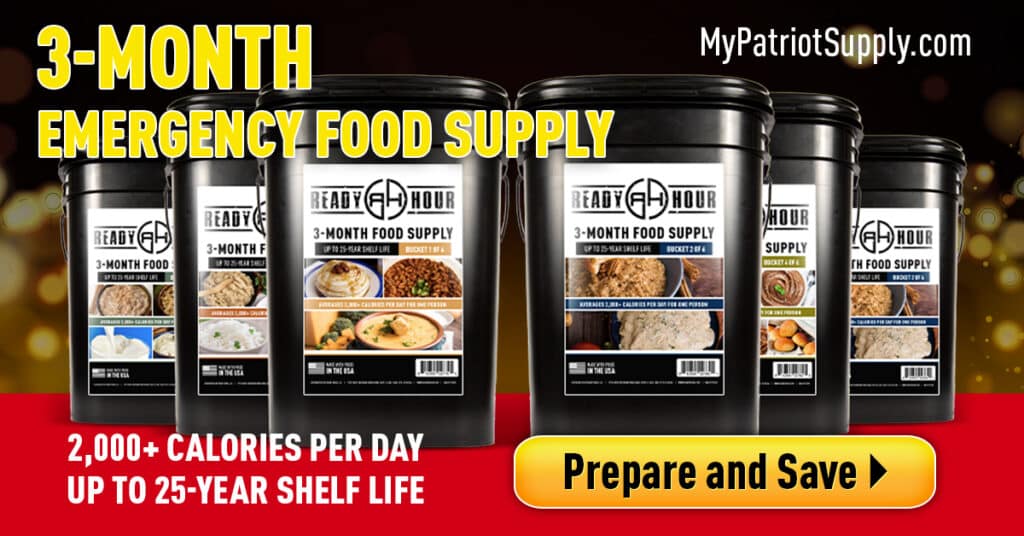Are you prepared for emergencies that may disrupt your access to food? Emergency food supply planning is a critical aspect of emergency preparedness, ensuring you and your loved ones have access to food when it may not be readily available. In this comprehensive guide to emergency food supply planning, we will take you through everything you need to know to prepare. From assessing your needs, choosing the right type of food, determining storage needs, creating a meal plan, rotating your supply, considering water supply, planning for special needs, budgeting, and revisiting and updating your plan regularly, you will be fully prepared for any emergency situation.
Emergency food supply planning involves preparing and storing food to be used in case of emergencies or disasters. Emergencies can range from natural disasters like hurricanes, floods, and earthquakes to man-made disasters such as power outages, pandemics, and economic crises. Having an emergency food supply plan in place can help you and your family survive such emergencies and ensure that you have access to food when it may not be readily available.
Assessing Your Needs
Before you start your emergency food supply planning, it is essential to assess your needs. Here are some factors to consider:
How to Determine the Number of People to Feed
Determine the number of people you need to feed. Consider the number of people in your household and any additional family members or friends who may seek shelter with you during an emergency.
How Long You Need to Store Food
Determine how long you need to store food. The duration will depend on the potential risks and emergencies you may face. For example, if you live in an area prone to hurricanes, you may need to store food for at least a week.
Dietary Restrictions and Preferences
Consider any dietary restrictions or preferences you or your family members have. This information will be crucial when choosing the right type of food.
Specific Emergency Situations to Prepare For
Consider the specific emergency situations you need to prepare for. For example, if you live in an area prone to power outages, you may need to store food that does not require refrigeration.
Choosing the Right Type of Food
Choosing the right type of food is crucial when preparing your emergency food supply. Here are some factors to consider:
Non-Perishable Food Options
Choose non-perishable food options like canned goods, rice, and pasta. These foods have a long shelf life and do not require refrigeration.
Nutrient-Dense Food Options
Choose nutrient-dense foods like whole grains, dried fruit, and nuts. These foods provide essential vitamins and nutrients to keep you and your family healthy during an emergency.
Pros and Cons of Canned Goods, Freeze-Dried or Dehydrated Foods, and MREs
Canned goods are a popular choice for emergency food supply planning, but they can be heavy and take up a lot of space. Freeze-dried or dehydrated foods are lightweight and easy to store but can be expensive. MREs are convenient but can be high in sodium and preservatives.
Shelf Life Considerations
Consider the shelf life of the food you choose. Make sure to choose foods with a long shelf life, so they do not expire before you need them.
Importance of Having a Balanced Diet
Make sure to choose a variety of foods to ensure a balanced diet during an emergency. Include foods from each food group, including fruits, vegetables, grains, protein, and dairy.
Determining Storage Needs
Once you have chosen the right type of food, it is time to determine your storage needs. Here are some factors to consider:
Ideal Storage Conditions
Store your emergency food supply in a cool, dry place. Avoid storing food in basements or attics, as these areas can be damp and humid.
Container Options
Store your food in airtight containers to keep out air and moisture. Consider using plastic buckets, mylar bags, or vacuum-sealed bags.
Pest Control Tips
Take steps to prevent pests like rodents and insects from getting into your food supply. Store food off the ground and use traps or repellents to keep them away.
How to Organize Your Emergency Food Supply
Organize your food supply by keeping similar items together. Label containers with the contents and expiration dates to make it easy to rotate your supply.
Creating a Meal Plan
Creating a meal plan is essential to ensure you have enough food and to avoid waste. Here are some factors to consider:
Importance of Meal Planning
Meal planning is crucial to ensure you have enough food and to avoid waste. It also helps you create a balanced diet.
Meal Planning Tips
Plan meals that are simple and easy to prepare. Include foods that can be cooked without electricity or gas.
Simple, Easy-to-Prepare Meals
Consider meals like canned soup, pasta, or rice dishes that can be cooked on a camp stove or over a fire.
Recipes and Meal Ideas
There are many resources available online for emergency meal planning. Look for recipes that use non-perishable foods and require minimal preparation.
Rotating Your Supply
Rotating your supply is essential to ensure that your emergency food supply stays fresh and does not expire. Here are some factors to consider:
Importance of Rotation
Rotating your supply ensures that your food stays fresh and does not expire. It also helps you avoid waste.
How Often to Rotate
Rotate your supply every six months to ensure that your food stays fresh and does not expire.
Tips for Rotating Your Supply
Use the oldest food items first and replace them with new items. Keep track of expiration dates and create a rotation schedule.
How to Use and Replace Expired Food Items
Do not use expired food items. Instead, replace them with new items when you rotate your supply.
Considering Water Supply
Water is as essential as food in emergency situations. Here are some factors to consider:
Importance of Water in Emergency Situations
Water is essential for survival in emergency situations. You need to ensure that you have enough water stored for drinking, cooking, and sanitation.
Water Storage Options
Store water in food-grade containers. Consider storing at least one gallon of water per person per day for a minimum of three days.
Water Purification Methods
In case you run out of stored water, learn how to purify water from natural sources like rivers and streams. You can use filters, purification tablets, or boil water to make it safe to drink.
How to Calculate and Store Enough Water
Calculate how much water you need based on the number of people in your household and the duration you need to store it. Store water in a cool, dry place away from direct sunlight.
Planning for Special Needs
If you or your family members have special dietary needs, you need to plan accordingly. Here are some factors to consider:
Importance of Accommodating Special Dietary Needs
Accommodating special dietary needs is essential to ensure that everyone in your household has access to safe and nutritious food.
Gluten-Free, Lactose-Free, and Vegetarian Options
Consider gluten-free, lactose-free, and vegetarian options when planning your emergency food supply. Look for foods that meet your dietary requirements.
Baby Food and Formula Considerations
If you have a baby, make sure to include baby food and formula in your emergency food supply.
How to Store and Prepare Special Needs Food Items
Store special needs food items separately and label them clearly. Make sure to prepare them according to the manufacturer's instructions.
Budgeting for Emergency Food Supply Planning
Budgeting for emergency food supply planning is essential to ensure that you have enough food without breaking the bank. Here are some factors to consider:
How to Create a Budget for Emergency Food Supplies
Create a budget based on the number of people in your household and the duration you need to store food.
Cost-Effective Food Options
Look for cost-effective food options like rice, pasta, and canned goods. Consider buying in bulk to save money.
How to Save Money on Emergency Food Planning
Look for sales and discounts on non-perishable items. Consider growing your food or buying from local farmers.
Revisiting and Updating Your Plan Regularly
It is essential to revisit and update your emergency food supply plan regularly to ensure that it is up to date. Here are some factors to consider:
Why You Should Revisit and Update Your Plan
Revisiting and updating your plan ensures that it is up to date and reflects any changes in your household or circumstances.
When to Update Your Plan
Update your plan every six months or whenever there are significant changes in your household or circumstances.
Tips for Updating Your Plan
Review your plan to ensure that it reflects your current needs. Check expiration dates and rotate your supply.
How to Ensure Your Emergency Food Supply is Always Ready
Keep your emergency food supply in a cool, dry place away from direct sunlight. Check expiration dates regularly and rotate your supply every six months.
Case Study: Surviving a Natural Disaster Without Proper Emergency Food Supply Planning
Mary and her family live in an area that is prone to natural disasters such as hurricanes, floods, and tornadoes. However, they never took the time to create an emergency food supply plan until a hurricane hit their area and knocked out power for several days.
Mary and her family were unprepared and had no emergency food supply. They tried to scavenge for food, but the local stores were closed, and many of the roads were blocked due to fallen trees. They were forced to eat whatever was available, which included a lot of unhealthy fast food and junk food.
After a few days, Mary's husband became ill due to the unhealthy diet, and they had to take him to the hospital, which was already overcrowded due to the disaster. They learned that many people were suffering from malnutrition and dehydration due to the lack of access to clean water and healthy food.
Mary realized the importance of emergency food supply planning and decided to create a plan for her family. She calculated the number of people who needed to be fed, how long they needed to store food, and their dietary restrictions. She chose nutrient-dense, non-perishable foods, such as canned goods and freeze-dried foods, and organized them in a safe place.
When another hurricane hit their area a year later, Mary and her family were well-prepared. They had enough food to last them for several days, and they were able to avoid the unhealthy food options that caused problems during the previous disaster. They were also able to help their neighbors who were not as prepared.
Mary's story shows the importance of emergency food supply planning and how it can make all the difference during a natural disaster. It is better to be prepared than to suffer the consequences of being unprepared.
Conclusion
Emergency food supply planning is essential to ensure that you and your family are prepared for any emergency situation. By assessing your needs, choosing the right type of food, determining storage needs, creating a meal plan, rotating your supply, considering water supply, planning for special needs, budgeting, and revisiting and updating your plan regularly, you can create a comprehensive emergency food supply plan that will ensure your family's safety and well-being. Start planning today and be prepared for any emergency situation that may arise.
Answers To Common Questions
Who needs emergency food supply planning?
Everyone should have a plan for emergencies, including food supplies.
What is emergency food supply planning?
It involves preparing and storing food for use during emergencies.
How long should emergency food supplies last?
Aim for at least a three-day supply, but ideally a two-week supply.
What if I don't have enough storage space for supplies?
Consider using under-bed storage containers or renting a storage unit.
How can I ensure my emergency food is safe to eat?
Rotate your supplies and check expiration dates regularly.
What if I don't have time to prepare an emergency food supply?
Start small and gradually build up your supplies over time.
The author of this guide is a seasoned emergency preparedness expert with over 20 years of experience in the field. They hold a degree in Emergency Management from a top-tier university and have worked with various organizations to develop and implement emergency preparedness plans. Additionally, they have conducted extensive research on emergency food supply planning, including analyzing case studies from past natural disasters and emergencies.
The author has also worked closely with nutritionists and dietitians to ensure that the food options presented in this guide are not only long-lasting but also nutrient-dense and balanced. They have collaborated with food storage companies and manufacturers to understand the pros and cons of different types of food storage containers and the ideal storage conditions for various food items.
In addition to their professional qualifications, the author has personally experienced several emergency situations where having a well-planned emergency food supply was essential. Their firsthand experience and expertise make them well-equipped to guide readers through the process of creating and maintaining an emergency food supply plan.





